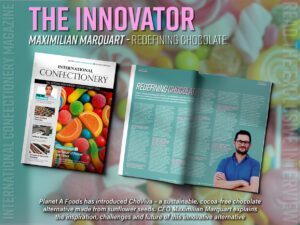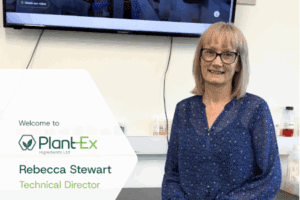International Confectionery speaks with Cargill Cocoa & Chocolate President, Harold Poelma, discussing transparency, the impact of COVID and technological innovation in the cocoa sector.
In 1865, William Wallace Cargill became the owner of a single grain warehouse in Conover, Iowa. Today, the company he founded is now one of the largest privately held enterprises in the world, with 155,000 employees located in 70 countries.
Today, Cargill creates cocoa and chocolate products for chocolate, confectionery and food manufacturers across the globe – producing cocoa powder, cocoa butter and cocoa liquor as well as chocolate, coatings and fillings for industrial applications. Their customers include some of the biggest chocolate, confectionery and food businesses in the world. Their brands, which include Gerkens, Merckens, Peter’s Chocolate, Wilbur, Veliche and Smet, are all backed by the global resources of Cargill, including their renowned chocolate engineers.
“While no industry or company is immune to the impacts of COVID-19, we learned we can be more agile, make decisions faster and accelerate change by putting customers at the centre of the way we work,” Harold Poelma, President of Cargill Cocoa & Chocolate, says.
“We worked around the clock to keep supply chains moving, drawing on decades of experience navigating major global issues to mitigate the pandemic’s impact on our operations. In Europe, for example, Cargill teams supported one customer’s surge in demand for chocolate powder right before Easter—supplying quantities that others were unable to fulfill. In the Philippines, a chocolate drink plant idled because of a lack of access to cocoa powder. We found the volume, allowing the business to reopen.
“Perhaps most importantly, we prioritised the health and safety of our employees and those working with us, including cocoa farmers and community members. Early on, we recognised the critical importance of securing personal protective equipment for our employees. This helped keep our employees healthy, our facilities operating and prevented disruptions to our supply chains.”

Technology to improve transparency in the cocoa sector
Cargill says it is bringing their vision of a more sustainable cocoa industry to life by embedding digital capabilities throughout their supply chain, leveraging the power of technology to create lasting benefits for cocoa farmers and their communities. At the same time, they are providing transparency to their customers through their new CocoaWise digital portal.
“CocoaWise provides customers with fast, easy access to the sustainability data of Cargill’s cocoa supply chain. With full, real-time visibility, CocoaWise enables customers to be more deeply connected to the communities from which they purchase their cocoa and see first-hand the impact of financial investments in key initiatives that meet the needs of the cocoa farming communities on the ground, such as providing sustainable agriculture coaching for farmers, entrepreneurship trainings for women and nutritional programmes for families.
“CocoaWise pulls information from a centralised data platform, CocoaWise 360, which is fed from a suite of Cargill’s digital tools that are designed to increase transparency and traceability while enhancing cocoa farming practices and community well-being,” says Poelma.
“We’re also harnessing the power of technology to guide our efforts as we work to eliminate deforestation. Tackling deforestation and restoring landscapes starts with knowing where to look. Digital tools such as GPS-powered tablets enable us to make polygon maps of all the farms in our supply chain. We also work with the World Resources Institute’s Global Forest Watch initiative, which provides satellite imagery and machine-learning techniques to identify forest change at a rapid pace. Using our GPS farm mapping, in combination with satellite imagery, we can identify deforestation risks and take action. Currently, we’ve mapped 72% of the cocoa farms in our direct supply chain, a critical step toward delivering on our pledge to eliminate deforestation in our cocoa supply chain by 2030.
“Our CocoaWise Map is yet another mechanism we’re using to infuse greater transparency into our cocoa supply chain. This interactive map shows the name and location of the 128 cooperative offices in Côte d’Ivoire, the seven buying stations in Ghana and the 11 buying stations in Cameroon that belong to our direct sourcing network in these countries.”
Technology is playing a central role in efforts to improve transparency and foster sustainability across supply chains. With their digital portal, CocoaWise, and their data platform, CocoaWise 360, they are taking the next steps on their journey to source, manufacture and market 100% -sustainable cocoa ingredients by 2030.
Trends in the industry
Consumer demand for increased transparency is growing, as is their appetite for food that is compatible with their ethical values. In response, Cargill has developed a refreshed and expanded portfolio of innovative products and services, aimed at enabling their customers to more directly support sustainability efforts that align with their brand promise.
“These new Promise Cocoa offerings will enable customers to purchase sustainable cocoa sourced directly from our known and trusted farmer organisations. Going one step further, customers may choose to invest in a high-impact project linked to a key challenge in the cocoa sector, such as gender inequality, deforestation or child labour. This new sustainability-infused portfolio will help customers realise their environmental and social welfare commitments, reinforce brand value and even help create added brand equity and preference among consumers and stakeholders.
“As part of this offering, we’ve launched a new digital customer portal, CocoaWise, which will provide unprecedented access to data, information and storytelling aspects of our sustainably sourced cocoa, connecting brands to the farming communities that provide their cocoa.
“Other trends, such as the premiumisation of chocolate, are influencing this sector. Consumers are looking for indulgent experiences that engage all the senses. When it comes to chocolate, taste is absolutely critical, but texture plays a big role, too. That reality is one of the inspirations behind Cargill’s FlexFillings range, our portfolio of custom-designed specialty fats.”
A word of advice
Poelma offers some advice for those battling against the strains of COVID-19: “This is a challenging time for us all, but amidst all the uncertainty, core tenants remain. First, take care of your people. Throughout this pandemic, we’ve prioritised the health and safety of our employees and partners – which in turn has helped us continue to provide the ingredients and services our customers depend on.
“That leads into my second point: Make sure your suppliers can take care of you. Look for partners who have built resiliency into their supply chains and can add value at every point on your journey together. At Cargill, we pride ourselves on consistently delivering the high-quality ingredients our customers need – when they need them. We offer market-leading price risk services to help brands navigate volatile trading conditions; build sustainability, traceability and transparency into all our operations; and back our ingredients with a wide network of specialists and resources.”
He concludes: “Finally, it’s imperative that brands stay close to their consumer-base, to understand and react to shifts in behaviour and demand. We can help brands navigate these uncertain waters, using our insights into market and consumer trends to guide new product development. With resources like our new House of Chocolate, we can train, co-create and inspire our customers, providing all the support needed to bring innovations to market in a very dynamic consumer environment.”









